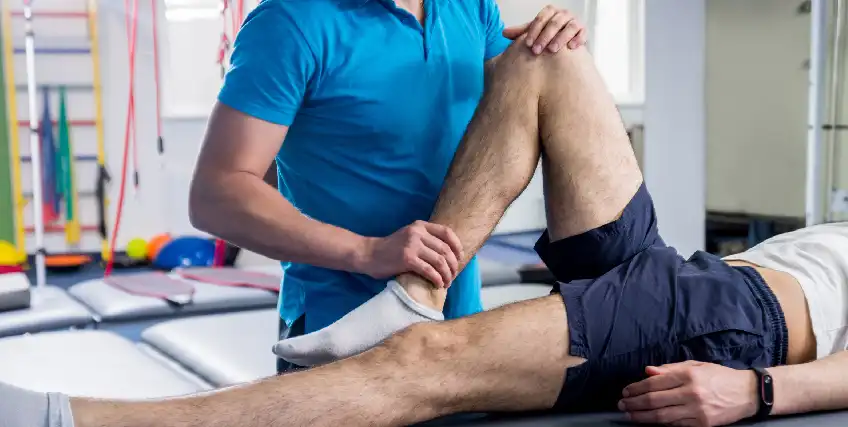Equipment Leasing for Physical Therapists: What You Need to Know
August 05, 2025 | Last Updated on: August 06, 2025

Operating a physical therapy clinic requires efficient tools that support healing, function, and comfort. It also requires advanced ultrasound machines and adjustable treatment tables, as every piece of equipment plays an important role in patient care. However, for small business owners, the challenge lies in acquiring these essentials without draining working capital or delaying clinic growth.
Physical therapy equipment leasing offers a practical solution for physical therapists to get what they need without straining their working capital. In this article, we’ll explore the leasing options, financing solutions, and how to choose what fits your specific needs.
What is Physical Therapy Equipment Leasing?
Physical therapy equipment leasing is a type of equipment financing option that lets clinics use essential medical equipment without buying it outright. Instead of making a large down payment, you can pay fixed monthly payments over an agreed lease term.
The lease term for equipment often depends on the company’s needs and the cost of the equipment. However, after the lease ends, you can return the equipment, upgrade to a newer model, or purchase it. Therefore, this flexibility helps small business owners preserve cash flow while improving patient care.
Physical therapy equipment leasing also opens the door to trying newer pieces of equipment in the healthcare industry without committing to full ownership. Medical clinics can test the effectiveness of state-of-the-art tools such as cold therapy devices or upgraded treatment tables before deciding on permanent additions. Hence, this approach allows more room for adapting to evolving business needs.
Difference Between Equipment Leasing vs Equipment Buying
To understand the difference between physical therapy equipment leasing and buying, the most important thing is to plan. Physical therapists need to know which medical equipment to invest in for their clinic. However, both physical therapy equipment financing options have benefits depending on your financial strategy, growth, plans, long-term goals, and equipment needs.
While equipment buying offers immediate ownership, physical therapy equipment leasing keeps your clinic agile and better equipped to respond to shifting patient needs and emerging technologies. Therefore, before considering any of the financing options, explore both and get a clearer picture of how to maximize your budget.
Some clinics may opt to lease high-cost equipment and purchase lower-priced items outright. On the other hand, others may choose a hybrid route, using medical equipment leasing for specialized devices while relying on equipment vendors for refurbished or used equipment to manage costs.
Here’s the difference between physical therapy equipment leasing vs equipment purchases.
- Ownership: When you purchase equipment, you own it. Whereas leasing companies retain ownership until you buy the equipment.
- Upfront Costs: Buying equipment often requires a significant down payment. While physical therapy equipment leasing reduces upfront costs and spreads payments out.
- Flexibility: Purchasing equipment locks you into long-term use. While, leasing programs offer more flexibility for upgrades.
- Value Over Time: Capital equipment leasing may cost more in total, but it includes maintenance and other services. Whereas, equipment purchasing requires full reinvestment each time your equipment becomes less efficient or lacks current functionality.
Why Consider Leasing Over Buying
Physical therapy equipment leasing provides medical practitioners with several advantages. This financing program helps balance business needs, growth, and operational cash flow. This is especially important in the physical therapy field, where clinics often face rapid technological updates and evolving patient expectations.
When compared with purchasing, equipment leasing limits the risk of locking money into equipment that may become outdated in just a few years. Additionally, it gives access to the newest physical therapy tools without the need for larger upfront investments. Hence, this flexibility allows small business owners to budget smartly with a faster response to new treatment demands.
Here are some of the advantages of physical therapy equipment leasing.
- Lower Upfront Investment: With leasing, you preserve working capital for other things like rent, staffing, or marketing.
- Modern Tools: Equipment leasing allows business owners to stay competitive with high-quality physical therapy equipment like hydrotherapy or cold therapy machines.
- Predictable Payments: Leasing allows you to manage monthly payments, making budgeting easier and more consistent.
- Possible Tax Advantages: Physical therapy practitioners can also get tax benefits through some leasing programs, reducing the taxable income. However, it is advised to consult a tax professional.
- Adaptability: Additionally, it’s easy to upgrade your clinic’s needs when considering physical therapy equipment leasing.
Commonly Leased Equipment in Physical Therapy Clinics
Physical therapy clinics can lease multiple tools to keep up with healthcare demands. These pieces of equipment support better function and recovery. Moreover, leasing options help avoid full equipment purchases while improving clinical outcomes.
- Electrotherapy and ultrasound machines: These machines assist in pain management and muscle rehabilitation.
- Treatment tables and hydraulic lift tables: Physical therapists can use these tables as they offer ergonomic benefits and comfort for patients.
- Exercise and rehab machines: Bikes, treadmills, and pulleys help improve strength and movement.
- Balance and gait training tools: Equipment like parallel bars, steps, and pads are used for recovery.
- Clinical software: Also, EMRs, billing software, and patient tracking tools are needed.
Pros and Cons of Physical Therapy Equipment Leasing
Physical therapy equipment leasing can help business owners to make better financial decisions, especially when balancing limited working capital. It also gives clinics access to medical equipment and helps preserve liquidity for marketing, staffing, or unexpected operational expenses.
Unlike purchasing, where a full payment or large down payment is required upfront, leasing spreads the cost over time. This structure allows clinics to remain competitive and responsive to evolving technology without facing financial strain.
Below are the common pros and cons of physical therapy equipment leasing that can help in choosing the right path forward.
Pros
- Cash Flow Management: Equipment leasing helps protect your cash flow.
- Easier Maintenance: Many physical therapy equipment leasing companies include servicing and support for equipment.
- Upgrade Opportunities: With leasing, business owners can upgrade their equipment when needed.
- Possible Tax Benefits: Operating lease payments may also qualify as a deductible business expense.
- Access to High-Quality Tools: Physical therapy equipment leasing gives access to multiple high-quality tools without any ownership.
Cons
- No Immediate Ownership: You don’t own the equipment unless you buy it at the end of the lease term.
- Higher Long-Term Cost: Equipment leasing could cost more than buying in the long run.
- Contract Terms: Early termination of leases may come with penalties.
- Use Restrictions: Some contracts limit customization or modification.
How to Apply for Physical Therapy Equipment Leasing
To apply for physical therapy equipment leasing is an easy task. However, it’s important to have a plan to ensure that you choose the right lender when considering leasing equipment.
- List Your Equipment Needs: List down the equipment that you need, such as treatment tables or hydrotherapy machines.
- Set a Budget: Then estimate what you can afford monthly.
- Research Lenders: Also, compare different financing programs from leasing companies or equipment vendors.
- Check Credit Score: A good credit score helps secure better leasing terms.
- Prepare Documentation: Gather all the necessary documents including tax returns, financial statements, and business plans.
- Apply Online: You can apply for physical therapy equipment leasing through a simple online application.
- Review Lease Terms: Make sure to understand the lease terms, fees, and end-of-term options.
You may also like: Short Term Vs Long Term Loans for Doctors
The Bottom Line
Leasing equipment typically offers a smart way for physical therapists to grow their practice without exhausting funds. It also helps reduce upfront costs and keeps your tools updated. Moreover, clinics can also lease used equipment depending on their business needs.
When choosing physical therapy equipment leasing, make sure to compare offers that align with your business’s specific needs. Also, review your leasing terms, any type of fees, and penalties for breaking the lease. Therefore, leasing equipment helps business owners maintain cash flow, access high-quality tools, and scale services.
FAQs About Physical Therapy Equipment Leasing
Is equipment leasing a better option than buying for physical therapy clinics?
Equipment leasing is a better option than equipment purchasing, depending on the clinic’s financial situation and future growth plans. Leasing may help preserve working capital and avoid large upfront costs, especially for new and expanding practices. However, equipment buying might make sense when a clinic has the resources to invest and plans to use them long-term without frequent upgrades.
What types of physical therapy equipment can be leased?
There are many types of physical therapy equipment that can be leased, including therapeutic ultrasound machines, treatment tables, hydrotherapy systems, rehabilitation bikes, and electronic medical records (EMR) software. Additionally, some clinics also lease used equipment to lower monthly payments.
Can small clinics with limited credit still qualify for leasing?
Qualifying for equipment leasing depends on multiple factors like business history, revenue, and credit scores. Some leasing companies may be more flexible than others, especially those experienced in working with healthcare providers. Hence, clinics that are just starting out may need to provide more documentation or consider leasing programs designed specifically for startups or small businesses.
How do possible tax benefits work with equipment leasing?
When considering equipment leasing, there may be potential tax advantages. However, these benefits vary based on the lease type and local regulations. For example, operating leases may allow clinics to deduct monthly payments as a business expense. However, how and when those deductions apply might change depending on the clinic's structure and lease terms. It’s usually best to consult a tax professional familiar with healthcare finance to explore all available benefits.
What happens at the end of a lease term?
At the end of a lease term, clinics have several choices depending on the lease agreement. They may purchase the equipment at its residual value, renew the lease, upgrade to a newer model, or return the equipment. Therefore, the best decision often depends on how useful the equipment is, whether new features are now needed, and how monthly payments compare to ownership costs.



